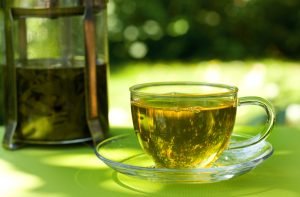What's On This Page?
ToggleThere is always some kind of tea in my house—a comforting ritual and a natural remedy rolled into one. Green tea, in particular, is a staple for millions worldwide. Known botanically as Camellia sinensis, it boasts a wealth of beneficial compounds like epigallocatechin-3-gallate (EGCG), a powerhouse that delivers anti-inflammatory, antioxidant, anti-fibrosis, and cell-protective benefits. These properties have cemented green tea’s reputation as a natural ally in the fight against cancer.
But there’s more to green tea than its anti-cancer properties. Practitioners have long used it as a diuretic to help the body shed excess fluids. While its antioxidants often take center stage, today, I’m shining a light on the intriguing relationship between green tea and your bladder. This topic resonates deeply if you find yourself “toilet mapping” every outing or making frequent trips to the restroom—day and night.
Understanding the Bladder Struggle
For many of us, the bladder works quietly in the background until issues arise. Nighttime trips to the bathroom can disrupt your sleep, leaving you exhausted. Incontinence drugs, particularly anticholinergics, are a common solution, but they often come with side effects like dry mouth and blurred vision. Topical estrogen can help tone the bladder in some cases, though synthetic, non-bioidentical estrogen carries significant risks to reproductive health. I mentioned anticholinergics… it made me think of an important article that you might read: Akathisias Make You Want to Jump Out of Your Skin.
As a pharmacist, I’ve seen the spectrum of treatments, from medications to physical therapies. Among these, pelvic floor training stands out as one of the most effective remedies—but it requires the guidance of a certified biofeedback therapist. And while that’s an excellent long-term solution, what if there were a simpler, more natural option? Enter green tea.
Green Tea’s Impact on Bladder Health
A recent randomized, double-blind, placebo-controlled study sheds light on green tea’s potential to support bladder health. In this study, published in Therapeutic Advances in Urology, 46 men with bladder and urinary tract symptoms participated in a three-month trial. These men experienced issues like poor urinary flow, incomplete bladder emptying, and erectile dysfunction. The researchers measured their levels of C-reactive protein (CRP), an inflammatory marker.
The findings were remarkable. The green tea blend significantly reduced urinary discomfort, improving symptoms by up to 35%. Urinary flow improved, CRP levels dropped, and even erectile dysfunction symptoms showed measurable improvement. While this study focused on men, the anti-inflammatory and soothing effects of green tea could be just as beneficial for women.

Green Tea and UTIs
If urinary tract infections (UTIs) are your nemesis, green tea might offer some relief. Studies, including one published in Frontiers in Biology, highlight green tea’s antimicrobial effects. It can inhibit the growth of E. coli (a common cause of UTIs) and even combat drug-resistant bacteria like MRSA. These antimicrobial properties make green tea a valuable ally for those prone to recurrent UTIs.
If you are prone to UTIs, you might be interested in my article entitled Corn Silk: 5 Key Benefits for Cystitis and Bladder Health.
Not for Everyone
While green tea offers numerous benefits, it’s not a one-size-fits-all solution. For some, green tea extract’s diuretic effects can be too intense. A friend of mine learned this the hard way—she took a diet pill containing green tea extract and had an embarrassing accident right before a shopping trip. For this reason, it’s crucial to approach green tea with care, especially if you’re considering supplements. Consult your healthcare provider to determine whether green tea is a good fit for your needs.
The Cancer Connection
Green tea’s relationship with bladder cancer is another compelling story. Research suggests that women who drink green or black tea are less likely to develop bladder cancer. Furthermore, individuals with bladder cancer, particularly men, who consume green tea have shown better five-year survival rates than non-drinkers.
Does this protective effect extend to prostate cancer? While more research is needed, early findings are promising. As always, consult your oncologist to discuss whether green tea could complement your treatment plan.
Brewing the Perfect Cup
Green tea’s benefits are undeniable, but preparation matters. Oversteeping can lead to a bitter brew, so keep steeping time between three and five minutes. For added flavor and nutrients, consider sweetening your tea with organic honey, STEVIA, or coconut sugar. Personally, I like to add a teaspoon of rose hips for a tart kick and an extra dose of vitamin C and antioxidants.
A Simple Step to Better Health
Incorporating green tea into your daily routine is an easy and enjoyable way to support bladder health and overall wellness. Whether you’re battling urinary issues, seeking to prevent infections, or looking for natural cancer support, this humble beverage has a lot to offer. Discuss it with your healthcare provider to see if green tea could be a beneficial addition to your lifestyle.
Here’s to better bladder health—and fewer restroom detours—one cup at a time.

Suzy Cohen, has been a licensed pharmacist for over 30 years and believes the best approach to chronic illness is a combination of natural medicine and conventional. She founded her own dietary supplement company specializing in custom-formulas, some of which have patents. With a special focus on functional medicine, thyroid health and drug nutrient depletion, Suzy is the author of several related books including Thyroid Healthy, Drug Muggers, Diabetes Without Drugs, and a nationally syndicated column.


